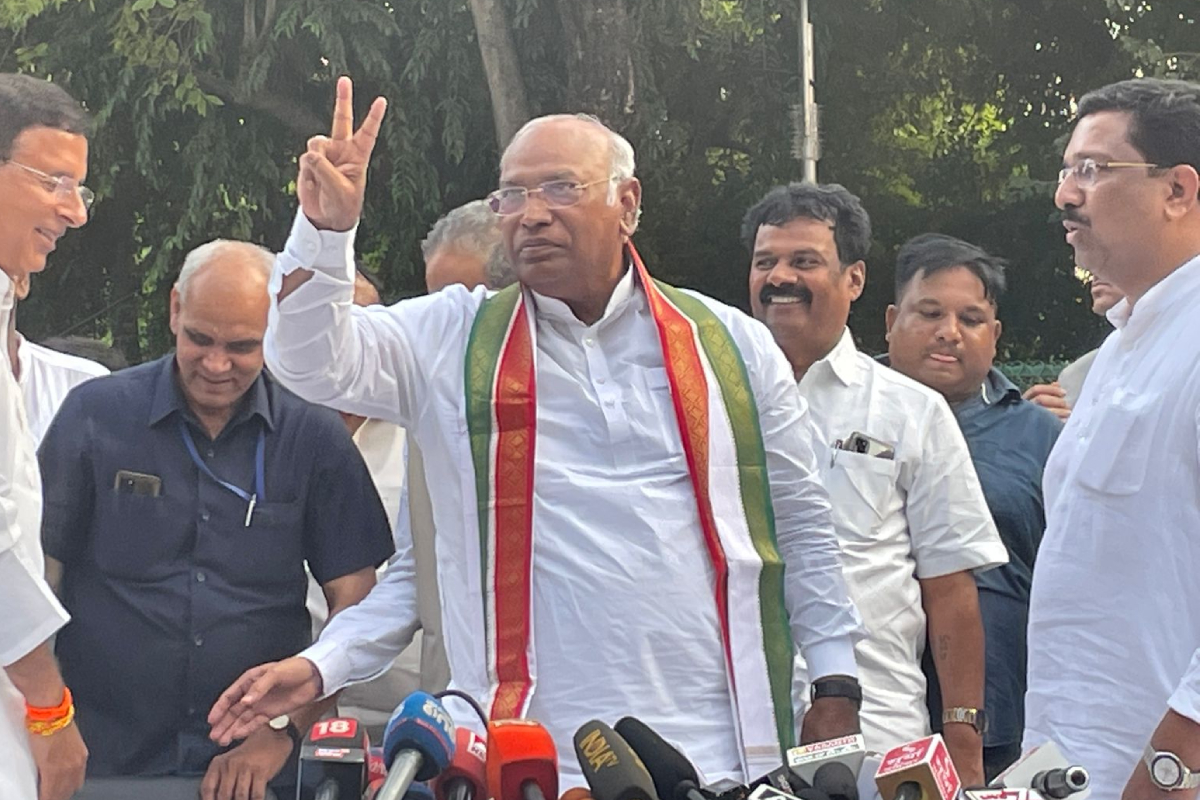Devkant Barooah, the then Congress president had once famously said, “India is Indira and Indira is India; who lives if Indira dies” at the height of the ‘Emergency’ in 1976. This obsequious statement became synonymous with sycophancy that still pervades the Grand Old Party. Election of octogenarian Mallikarjun Kharge as the new president of INC is no different as he has already made it known that he will work closely with the Gandhis (Sonia Gandhi, Rahul Gandhi and Priyanka Gandhi).
As expected Kharge polled 7897 votes while his opponent Dr Shashi Tharoor got 1072 votes from the delegates. Kharge’s victory was a bygone conclusion as he had tacit support of 10 Janpath. Congress leaders close to Gandhis had made it known about their obvious choice while Tharoor ploughed a lonely furrow. The Lok Sabha MP from Thiruvananthapuram must have seen the writing on the wall when three of the national spokespersons Deepender Hooda, Naseer Hussain and Gourav Vallabh resigned to campaign for Kharge.
Kharge is the second president of Congress from Karnataka. First one was S Nijlingappa who had taken over as Congress president in 1968 from K Kamraj.
Since its inception in 1885, INC had held elections for the post of its president in 1939, 1950, 1977, 1997 and 2000. It means elections were held on six occasions during its existence for 137 years. Elections to elect Congress president on October 17, 2022 was the fifth instance since independence when internal elections were held in the party. Gandhi family has controlled the party for about 40 years after independence. Pattabhi Sitaramayya had assumed office of Congress president in 1949. Since then, Congress has been led by 17 people out of which five have been presidents from the Gandhi family, starting from Pt Jawahar Lal Nehru, Indira Gandhi, Rajiv Gandhi, Sonia Gandhi and Rahul Gandhi.
Last elections for the Congress president were held in 20000 when Sonia Gandhi defeated Jitendra Prasad. Before that Sitaram Kesri had defeated Sharad Pawar and Rajesh Pilot in 1997. Kesri who then enjoyed the trust of Sonia Gandhi had won it big by polling 6,224 delegates’ votes against Maharashtra strongman Sharad Pawar’s 882 and Rajesh Pilot’s 354. Kesri’s term as Congress president had ended abruptly with Sonia Gandhi deciding to take over the reins of the party in her own hand rather than giving it to a party functionary.
Jitendra Prasada who had served as All India Congress Committee (AICC) General Secretary under Rajiv Gandhi and political advisor to PV Narsimha Rao had contested against Sonia Gandhi only to suffer a humiliating defeat at her hands who had polled 7,400 votes, while Prasada just got a meagre 74 votes.
Congress has been often criticised by the Bharatiya Janata Party (BJP) over dynastic rule due to the control of the Gandhi’s over the party. Sonia Gandhi had served till 2017 unchallenged when she handed over the mantle to her son Rahul Gandhi in 2017 who later resigned owing to his party’s defeat in 2019 Lok Sabha elections. Sonia Gandhi became the interim president after her son’s resignation as no leader was found capable of running the party.
There were repeated attempts within the party to convince Rahul Gandhi to take over the reins of the party again but he dithered. As the party’s support shrunk further following BJP’s win in crucial Uttar Pradesh assembly elections along with Goa, Manipur, Uttarakhand and Aam Aadmi Party (AAP) trumping it in border state Punjab, rumblings started within the party. Senior party leaders known as G-23 wrote letters to Sonia Gandhi to convene meetings of the Congress Working Committee (CWC) as the communication gap within the party was widening. Ahmed the then political advisor to the Congress president termed the G-23 leaders’ attempt as helping the BJP.
G-23 grouping was perceived as an attempt to challenge the authority of 10 Janpath. The chasm kept widening and senior leaders like Kapil Sibal, Ghulam Nabi Azad, Jatin Pradasa left the party. The coterie around Gandhis tried to convince that these leaders were irrelevant and the idea to hold internal party elections to elect a non-Gandhi should be initiated.
There is another school of thought among the Congress that wanted to maintain the supremacy of the Gandhis. The Bharat Jodo Yatra of Rahul Gandhi and the election of non-Gandhi president are interlinked.
Managers of Congress have planned elections in such a way that its former president was away in his Bharat Jodo Yatra when party delegates from across the country voted to elect a new president. The focus has remained on Rahul Gandhi with party leaders making a beeline to join the ongoing Yatra. Newly elected president Kharge too had joined the Yatra and made it known to the people that he was not averse to taking advice from the Gandhis to run the party. This was enough for the ruling BJP to target the Gandhis for perpetuating their rule by proxy.
But the run up to the elections to the Congress presidential polls was marred by a controversy as the original choice of the Gandhis was Rajasthan Chief Minister Ashok Gehlot. Party high command sent a team of observers including Kharge and general secretary in charge Ajay Maken to Jaipur to elect a new leader as the chief minister since the party believed in “one man one post” principle. Gahlot refused to toe the line and stalled the party resolution. Kharge fumed and termed Gehlot’s defiance indiscipline.
The biggest challenge that Kharge now faces is Ashok Gahlot. Can he upstage the Rajasthan chief minister and install Sachin Pilot as the new chief minister? Party insiders say it does not look that easy as Gahlot is a wily politician who knows how to play the game. Gahlot enjoys the majority among Congress legislators; any coercive move by the new party president Kharge can precipitate it further. Can Congress afford to lose another state at this juncture? Kharge will have to deal with it while BJP will be keenly watching his next move.









